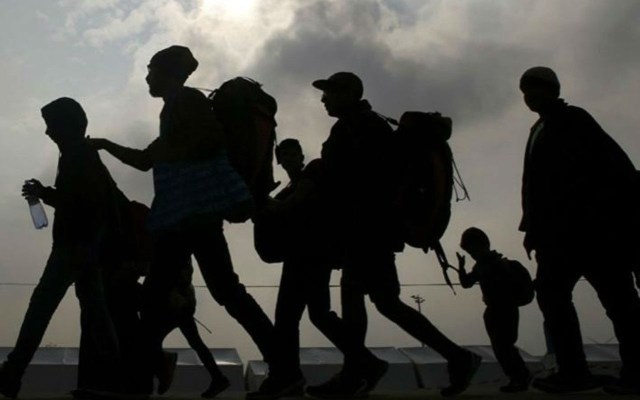
When Rosalba decided to flee her native Venezuela, she never imagined she would end up facing so many hardships abroad that returning home would eventually come to seem like her only viable option.
By Ángela Méndez-Triviño in Riohacha / unhcr.org
But three years after the 48-year old grandmother and her family left the bustling Venezuelan port city of Maracaibo, seeking safety in neighbouring Colombia, the coronavirus pandemic made it impossible for them to make ends meet. With the spectre of hunger and imminent eviction looming large, they took the wrenching decision to make the risky trip back home.
“When I left Venezuela, it was unliveable,” said Rosalba, referring to the situation in 2017, when she, her two adult children and two granddaughters fled to the Colombian seaside city of Barranquilla. “When I returned, it was worse.”
Rosalba would spend just a month in Venezuela before fleeing yet again, forced out by the deteriorating situation at home.
“It was a nightmare, a total nightmare”
With Latin America hit hard by the coronavirus pandemic, and lockdown and other restrictions taking a terrible economic and social toll throughout the region, tens of thousands of the estimated 5.4 million Venezuelans refugees and migrants living abroad have taken the drastic step of returning home over the past months.
Driven by many of the same factors that pushed Rosalba and her family to leave – penury and potential eviction – many have made the dangerous journey by whatever means possible, by bus, hitchhiking or even by foot, from as far away as Ecuador or Peru. The already difficult trip has been made that much harder by pandemic-related border closures that have forced many to resort to clandestine crossings that put them at even greater risk.
While the exact number of Venezuelan refugees and migrants who have returned home amid the pandemic is not known, Colombia’s migration authority estimates that more than 122,000 people have ignored the ongoing border closure between the two countries to cross back into Venezuela as of late November.
But like Rosalba, many of those who returned home during the pandemic have packed their bags and left once again amid the continued deterioration of conditions inside Venezuela. Insecurity in the country is spiralling, and food and medicine shortages have worsened, as have fuel shortages and power outages. Already on the rise, the number of Venezuelans leaving the country is expected to climb significantly in the coming months, as some lockdown measures are eased in other countries throughout the region.
“The coronavirus changed everything”
Before the pandemic, Rosalba’s life in Colombia had been slowly but steadily improving.
She found work caring for an elderly woman with a disability in Barranquilla, while her son supplemented the family income by working as a street vendor and occasional auto mechanic. After the pandemic hit, stay-at-home measures aimed at staunching the spread of COVID-19 meant that he could no longer go outside to sell his wares, leaving the family to try to scrape by on Rosalba’s modest salary. Their expenses outpaced her income, making food scarce and rent money increasingly hard to come by as the pandemic dragged on.
“The coronavirus changed everything,” Rosalba recalled, adding, “It shattered our happiness and made it so we had no choice but to return to Venezuela. At least there, we have our house, so we weren’t at risk of finding ourselves on the streets.”
With official border crossings between Colombia and Venezuela closed since March, the family relied on smugglers to usher them across a clandestine crossing, where they fell victim to criminals who prey upon those returning, stealing their meagre belongings and whatever money they might have.
“It was a nightmare, a total nightmare,” Rosalba said, with a shudder. “Late at night, a group of people stopped the truck and stole our belongings. We were so scared and were just praying that they wouldn’t kill us.”
Despite how hard the trip back had proved, she ended up staying in Venezuela for only a month before returning once again to Colombia.
She said things in Venezuela had “changed so much” even since she and her family left for the first time, in 2017.
“There’s no gas, so you have to go everywhere on foot,” she said, recalling her weeks back in Maracaibo last August. “I said to myself, ‘you can’t live here. At least in Barranquilla, I’ll be able to feed us.’”
And so, in September, Rosalba returned to Barranquilla, and to her former job as a home caregiver, by herself. She spent two days sleeping in a bus station in a border town before she was able to get in touch with her employer, who sent her the money for a bus ticket back to Barranquilla. She is now working off the advance even as she scrapes together remittances to send to her family back in Maracaibo.
Still, Rosalba is among the lucky ones. Many of the Venezuelans who have made the draining back-and-forth journey arrive in their host countries with little more than the clothes on their backs, even as they now face even slimmer prospects due to the often-devastating impact the pandemic has had on the communities that had welcomed Venezuelans refugees and migrants in years past.
In response, UNHCR, the UN Refugee Agency, is already stepping up its presence in border regions, providing emergency shelters and expanding health and psychosocial support services and cash transfer programmes. This week, 158 humanitarian organizations launched a US$1.44 billion plan to respond to the growing needs both of Venezuelan refugees and migrants in Latin America and the Caribbean, as well as to the needs of the communities hosting them.
Asked about her state of mind in the wake of the jarring back-and-forth journey to safety, Rosalba said she has very mixed feelings.

